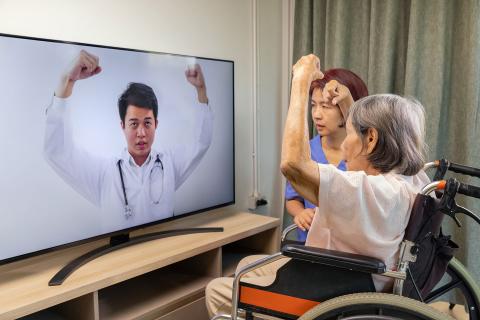Program of Research
Our lab investigates how to improve health, function, and well-being among people with chronic disabling conditions. Specifically, our research focuses on developing, testing, and optimizing remotely-delivered self-management, rehabilitation, and wellness interventions for people with neurodegenerative and neurovascular diseases (e.g., multiple sclerosis and stroke) and their unpaid caregivers (e.g., family and friends). An important aspect of this research is understanding why people respond differently to interventions so they can be tailored and personalized to be more effective for all.
Our research is funded by National Institutes of Health, Department of Defense, Patient-Centered Outcomes Research Institute, American Heart Association, and National Multiple Sclerosis Society. Several innovative research programs are currently under investigation.
Research Program Areas
Fatigue is one of the most common and disabling symptoms of many neurological disorders. Fatigue can create profound barriers to maintaining employment, participating in social and leisure activities, and engaging in self-care behaviors.
Our research team is focused on how to leverage biosensors, ecological momentary assessments, and blood and digital biomarkers to understand the underlying causes of fatigue and develop personalized interventions to reduce the impact of fatigue on daily activities.
Our most recent work funded by the Patient-Centered Outcomes Research Institute (PCORI) focuses on testing telerehabilitation interventions aimed at promoting self-management skills to reduce the impact of fatigue on daily activities in people with multiple sclerosis (MS).
Learn more about the study here.
We have now completed the study. If you are interested in conducting a secondary analysis with the data collected from this PCORI-funded study, please complete this form.
People with neurological conditions often have comorbidities that can accelerate functional declines. A common comorbidity in people with neurological conditions is obesity. Obesity can initiate and accelerate a cycle of functional declines. It can adversely affect mobility, fatigue, and mood, which subsequently increases barriers to engaging in healthy behaviors. Our research team focuses on developing and testing novel weight management interventions.
Our most recent work focuses on evaluating and refining a novel weight management interventions called SystemCHANGE developed by Dr. Shirley M. Moore. SystemCHANGE is based on ecological frameworks of behavior change, which shifts the focus from changing cognitions to changing the environment in which the behavior is performed. The SystemCHANGE weight management intervention focuses on promoting a healthy diet, engaging in physical activity and exercise, and supporting self-management behaviors among people with multiple sclerosis or stroke.
Self-management behaviors can play a vital role in improving the quality of life among people with disabling neurological conditions. Self-management behaviors are tasks and skills that are needed to effectively manage a disease. Self-management tasks and skills include problem solving, decision making, utilizing resources, communicating with others, taking action, and self-tailoring. Our research team focuses on using quantitative, qualitative and mixed methods to understand how to promote and support self-management behaviors.
Our most recent research focuses on identifying the factors that influence engagement in fatigue self-management behaviors (e.g., activity pacing, exercise, physical activity, energy conservation, and cognitive behavioral techniques) among people with multiple sclerosis.
Self-management and rehabilitation interventions that are delivered remotely in a person's home can increase access to care and may provide a low cost alternative to costly in-person visits. Commonly used technologies in telerehabilitiation include webcams, portable virtual reality platforms, mobile applications, videoconferencing, and video game consoles. Our research team focuses on evaluating the usability of this technology, developing functional assessments that can be delivered remotely, and discovering optimal ways of tailoring and personalizing telerehabilitiation interventions to the characteristics of each participant.
Our most recent research focuses on comparing delivery modes of telerehabilitation interventions that improve the quality of life of people with neurodegenerative disease and their family caregivers.
Interested in participating in our research studies?
Request more information on participating in our research studies on our social media platforms: I-Well Research Facebook, I-Well Research Instagram or I-Well Research Twitter. Or contact Dr. Plow at map208@case.edu
Interested in learning more about the Frances Payne Bolton School of Nursing?
Visit our school's main website and check out our robust PhD Program.
Meet Our Research Team
Dr. Plow is currently accepting undergraduate, MS and PhD level students in his lab as well as experienced research staff members. Teaching assistantships and research fellowships may be available to qualified individuals. Email Dr. Plow at map208@case.edu for more information.
Christopher Young
Email: cxy419@case.edu
Sarah Kearney
Email: sxk1764@case.edu
Research Assistant - Open Position
Layeth Sweidan
Email: layeth.sweidan@case.edu
Samantha Nichols
Email: skn33@case.edu
Postdoc - Open Position
Postdoc - Open Position
Graduate Student - Open Position






